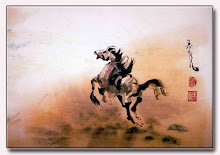If you have raced with men on foot and they have worn you out, how can you compete with horses? If you stumble in safe country, how will you manage in the thickets by the Jordan? Jeremiah 12:5
Jeremiah has a heartbreaking task. The prophets before him were told to deliver the message to God’s people: repent, or destruction will come upon you. A difficult message, to be sure. But Jeremiah’s message is even more devastating: the time for repentance is past.
“I will allow no pity or mercy or compassion to keep me from destroying them.” Jer 13:14b
All that is left for the nation of Israel is to give glory to God and await His judgement.
“Give glory to the LORD your God before he brings the darkness, before your feet stumble on the darkening hills. You hope for light, but he will turn it to thick darkness and change it to deep gloom.” Jer 13:16When I think of the reality of the lives of the prophets, I am struck by the fact that men actually lived out these lives. They are too often seen only as lines in the pages of a book, the stuff of myths we dismiss all too easily. Yet Jeremiah lived, a human being with all our common frailties, called to incredible acts of faith that we would consider, probably, the acts of a madman.
God tells Jeremiah to buy a “linen girdle” and to wear it. Later, he is told to hide it in the cleft of a rock by the river. Later still, he is told to retrieve it. The ruined garment is compared to the nation of Israel. It is a wonderful illustration for those of us looking back, centuries later. But how mad the actions of Jeremiah must have seemed to his own people—his own people, who had come to prefer the messages of peace and safety delivered by their false prophets, while plotting against the life of God’s true prophet, Jeremiah.
Yet Jeremiah is still praying. He contends with God for his nation. God corrects him:
“Do not pray for this people nor offer any plea or petition for them, because I will not listen when they call to me in the time of their distress.” Jeremiah 11:14
Jeremiah’s life was difficult. He was hated. He was misunderstood. He lived in obedience to a voice he alone could hear. And in his weakness, he contended with God. Yet instead of delivering a message of comfort and peace, even to Jeremiah, God tells Jeremiah that even more strength will be required of him. Jeremiah must steel himself for what is coming.
If you have raced with men on foot and they have worn you out, how can you compete with horses? If you stumble in safe country, how will you manage in the thickets by the Jordan? Jeremiah 12:5
